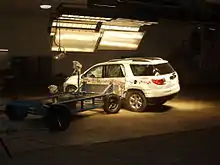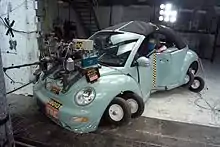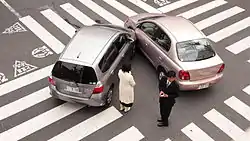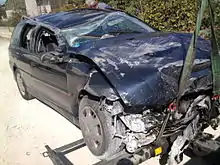Side collision
Side collisions are vehicle crashes where the side of one or more vehicles is impacted. These crashes often occur at intersections, in parking lots, and when two vehicles pass on a multi-lane roadway.




Occurrences and effects
For fatalities, in the United States, in 2008, a total of 5,265 (22%) out of 23,888 people were killed in vehicles which were struck in the side.[1]
For speed, in Europe in 2015, it is considered that best designed cars provide serious front crash protection with speeds up to 70 km/h for car occupants wearing seat belts in frontal impacts and 50 km/h in side impacts[2] It is considered that passenger car fatalities and seriously injured side impacts account for about 35 to 40%.[2] In most European countries, another stakeholder is involved in the side impact, with a rate between 45% and 66%.[3] But side impact (22% to 29%) is less common that frontal impact (61% to 69%).[3]
For European motorcyclists, side impact is the second most frequent location of impact.[3]
For European cyclist, thorax injuries are associated with side-impact injuries in urban areas and/or at junctions.[3]
In European countries, such as UK, Sweden and France, around one quarter of traffic injuries are produced by side collision, but among people subject to killing injuries the side impact account for 29 to 38% of those fatal injuries.[4]
In European vehicle side impact, 60% of casualties were "struck side", while 40% were "non struck side", in 2018.[4]
Fatal casualties count as 50% and 67% in UK and in France, in 2010[4]
Also, side collision are not well managed with child restraints which are not enough taking into account the movement of the child's head and prevent contact with the car's interior.[4]
For light vans and minibuses in 2000 in UK and Germany, between 14% and 26% of accidents with passenger cars are side impact[4]
In Shanghai, in China, 23% of the 1097 serious accidents occurred between June 2005 and March 2013 are side impact accidents, there the leading collision mode, according to the Shanghai United Road Traffic Safety Scientific Research Center (SHUFO) database.[5] The head and neck are involved in around 64% of the casualties.[5]
Broadside or T-bone collision
Broadside collisions are where the side of one vehicle is impacted by the front or rear of another vehicle, forming a "T". In the United States and Canada this collision type is also known as right-angle collision or T-bone collision; it is also sometimes referred to by the abbreviation "AABS" for "auto accident, broadside".[6] Vehicle damage and occupant injury are more likely to be severe, but severity varies based on the part of the vehicle that is struck, safety features present, the speeds of both vehicles, and vehicle weight and construction.
When a vehicle is hit on the side by another vehicle, the crumple zones of the striking vehicle will absorb some of the kinetic energy of the collision. The crumple zones of the struck vehicle may also absorb some of the collision's energy, particularly if the vehicle is not struck on its passenger compartment. Both vehicles are frequently turned from their original directions of travel. If the collision is severe, the struck vehicle may be spun or rolled over, potentially causing it to strike other vehicles, objects, or pedestrians. After the collision, the involved vehicles may be stuck together by the folding of their parts around each other.
An occupant on the struck side of a vehicle may sustain far more severe injuries than an otherwise similar front or rear collision crash.
Side-impact airbags can protect vehicle occupants during side collisions, but they face the same limitations as other airbags. Additionally, side impact wrecks are more likely to involve multiple individual collisions or sudden speed changes before motion ceases. Since the airbag can only provide protection during the first collision, it may leave occupants unprotected during subsequent collisions in the crash. However, the first collision in a crash typically has the most severe forces, so an effective airbag provides maximum benefit during the most severe portion of a crash.
Broadside collisions are frequently caused by a failure to yield right of way. In the case of collisions in an intersection, the cause is often a result of one vehicle failing to obey traffic signals (fail to stop or running past a red light). As with any crash, increased speed may increase crash severity.
Testing
Euro NCAP, IIHS and NHTSA test side impacts in different ways. As of 2015, they all test vehicle-to-vehicle side impacts,[7][8] where heavier vehicles have lower fatality rates than lighter vehicles.[9]
NHTSA and EuroNCAP also test the more severe vehicle-into-pole side impacts,[10] where smaller vehicles have the same fatality rate as larger vehicles.[9]
Newer cars have improved safety of front crashes, but side impacts are also deadly; about 9,700 people were killed in side impacts in the US in 2004.[11] Side airbags became mandatory in 2009 in the US, saving an estimated 1,000 lives per year. [12] Research indicates that the vehicle's underbody is the best place to reinforce structures to reduce intrusion by the pole. [13]
General list of side impacts

These are lists of cars with notable aspects of side impact.
List of cars after 2011
The NHTSA results are evaluated by the National Highway Traffic Safety Administration using Office of Crashworthiness Standards, New Car Assessment Program (NCAP) Side Impact Laboratory Test Procedure[14] and Side Impact Rigid Pole Laboratory Test Procedure[15] to display a simple star-rating. The "primary purpose of the NCAP side impact program is to provide comparative vehicle side protection information to assist consumers in making vehicle purchase decisions, thereby providing an incentive for vehicle manufacturers to design safer vehicles."[15]
The IIHS results are evaluated by Insurance Institute for Highway Safety using their protocols.[16][17]
This list shows the most notable of newer tested vehicles tested via NHTSA and IIHS. Some provide good protection, some less so, and some developed improved safety in response to a low result (Dodge Ram and Fiat 500). Some are common examples of their type.
Sorted roughly by rating, Head injury criterion (HIC) and Crush.
| Year [N 1] |
Manufacturer | Model | Type | Number produced [N 2] |
Impactor (MDB) into Vehicle[N 3] |
Vehicle into pole |
Comment |
IIHS side rating |
Euro NCAP side rating | |||||
|---|---|---|---|---|---|---|---|---|---|---|---|---|---|---|
| Maximum Crush[N 4] | HIC [N 5] | Rating [N 6] | Maximum Crush | HIC | RLSA[N 7] | Rating | ||||||||
| 2014 | Jeep Wrangler | SUV | 1 million[18] | mm | N/A[19] | mm | g | N/A | Poor[20][21] | N/A | ||||
| 2012 | Chrysler | 200[22] | Mid | 202 mm | [23] | 392 mm | 1987 | 51 g[24] | Head injury criterion above threshold. | Good[25] | N/A | |||
| 2015 | Toyota | Hilux/Tacoma[26] | Truck | 5+ million[27] | 305 mm | 125+292[28] | 516 mm | 451 | 57 g[29] | |||||
| 2013 | Fiat | 500[30] | Supermini | 1+ million[31] | 164 mm | 166+382[32] | 354 mm | 224 | 54 g[33] | MDB: Pelvic force and pax RLSA within threshold. | Good[34] | N/A | ||
| 2012 | Fiat | 500[35] | Supermini | 160 mm | 127+410[36] | 354 mm | 224 | 54 g[33] | MDB: Pax pelvic force over threshold, and RLSA near. | |||||
| 2013 | Dodge | Ram 1500[37] | Truck | 365 mm | 16+30[38] | 603 mm | 483 | 48 g[39] | All parameters within limits. | N/A[40] | N/A | |||
| 2011 | Dodge | Ram 1500[41] | Truck | mm | 462 mm | 519 | 87 g[42] | Pole Test: Pelvic force and RLSA over threshold. | ||||||
| 2014 | Mercedes-Benz | E-Class[43] | Sedan | 129 mm | 92+244[44] | 343 mm | 492 | 53 g[45] | Pole Test: Pelvic force 4770 N of a threshold of 5525 N | |||||
| 2012 | Chrysler | Town & Country[46] | Minivan | 298 mm | 51+135[47] | 389 mm | 294 | 47 g[48] | Pole Test: Pelvic force 3503 N of a threshold of 5525 N | Good[49] | N/A | |||
| 2014 | Audi | Q5[50] | CUV | 188 mm | 59+166[51] | 467 mm | 253 | 54 g[52] | ||||||
| 2011 | Volvo | XC60[53] | CUV | ½ million[54] | 170 mm | 60+231[55] | 462 mm | 242 | 45 g[56] | |||||
| Year | Manufacturer | Model | Type | Produced | mm | mm | g | Comment | Good | |||||
- Model Year of car crash-tested, not year of Overall Rating. Older crash tests usually carry over to newer car models; easily checked by comparing ratings and document numbers for different years.
- Number of cars produced of this model.
- Also known as Moving Deformable Barrier.
- Free space left after impact.
- Head Injury Criteria (HIC36) has a threshold of 1000; lower is better. MDB HIC shows front+rear seat of impact side.
- Side Barrier Rating, combines front and rear seats.
- RLSA=Resultant Lower Spine Acceleration, measured in g-force. Detract rating over 50g. Threshold is 82g.
Limits are:[14][15]
Moving Deformable Barrier (MDB): HIC max. 1000, Chest injury max. 44mm, abdominal injury max. 2500 Newton, pelvis injury max. 6000 N. There are additional limits for passenger similar to pole test.
Rigid Pole: HIC max. 1000, Lower Spine acceleration max. 82g, Pelvis sum max. 5525 N
List of cars before 2011
Sorted roughly by rating.
| Year [M 1] |
Manufacturer | Model | Type | Number produced [M 2] |
NHTSA rating |
IIHS side rating |
Euro NCAP side rating |
Comment |
|---|---|---|---|---|---|---|---|---|
| 2003-2006 | Ford | Crown Victoria | Full-size | Poor[58][11] | N/A | Structure rated "Poor" | ||
| 2008-2015 | Jeep Wrangler | SUV | 1 million[18] | N/A[19] | Poor[20][21] | N/A | Structure rated "Acceptable" | |
| 2004 | Mitsubishi | Galant | Sedan | Poor[60] | 2005 with airbag is Good at IIHS | |||
| Year | Manufacturer | Model | Type | Produced | Good | N/A |
- Model Year of car crash-tested, not year of Overall Rating. Older crash tests usually carry over to newer car models; easily checked by comparing ratings and document numbers for different years.
- Number of cars produced of this model.
See also
References
- http://hdl.handle.net/10919/76999
- https://ec.europa.eu/transport/road_safety/sites/roadsafety/files/ersosynthesis2015-seriousinjuries25_en.pdf
- https://ec.europa.eu/transport/road_safety/sites/roadsafety/files/injuries_study_2016.pdf
- https://ec.europa.eu/transport/road_safety/sites/roadsafety/files/pdf/ersosynthesis2018-vehiclesafety.pdf
- https://www-esv.nhtsa.dot.gov/Proceedings/24/files/24ESV-000016.PDF
- Logan, Carolynn M.; Rice, M. Katherine (1987). Logan's Medical and Scientific Abbreviations. Philadelphia: J. B. Lippincott Company. p. 3. ISBN 0-397-54589-4.
- "NHTSA Crash Test". Consumer Reports. April 2014. Retrieved 5 October 2015.
- "Euro NCAP - Side Mobile Barrier". Euro NCAP. Retrieved 5 October 2015.
- Ray, M.H. (1999). "Impact conditions in side-impact collisions with fixed roadside objects". Accident Analysis & Prevention. 31 (1–2): 21–30. doi:10.1016/S0001-4575(98)00041-4. PMID 10084615.
- "Euro NCAP - Side Pole". Euro NCAP. Retrieved 5 October 2015.
- "Impala, Avalon are top large cars in side crash test". iihs.org. Retrieved 7 October 2015.
- Bengt Halvorson (26 July 2007). "Top 20 Most Dangerous Vehicles". Forbes. Archived from the original on 25 September 2015.
- Billot et al. "Pole Impact Test: Study of the two current Candidates in Terms of Cost and Benefits for France" page 3-4. PSA Peugeot Citroën
- Side Impact Laboratory Test Procedure, Moving Deformable Barrier NHTSA Office of Crashworthiness Standards, September 2012. 285 pages in 9MB
- Side Impact Laboratory Test Procedure, Rigid Pole NHTSA Office of Crashworthiness Standards, September 2012. 224 pages in 8MB
- http://www.iihs.org/iihs/ratings/ratings-info/side-test
- "Technical protocols". iihs.org.
- "One in a Million: Toledo Assembly Complex Marks Production of One-Millionth Jeep Wrangler JK" (Press release). Chrysler Group LLC. Retrieved 16 February 2014.
- "2016 Jeep Wrangler 2DR 4WD" NHTSA (click Side Crash)
- "2015 Jeep Wrangler, Small SUV". iihs.org.
- Sean Williams (16 March 2014). "5 Auto Brands That Fared the Worst in the IIHS Crash Safety Tests -- No. 2 Is a Real Shock!". The Motley Fool. Archived from the original on 17 January 2015.
- "2014 Chrysler 200 4 DR FWD" NHTSA (click Side Crash)
- NCAP Moving Deformable Barrier Side Impact Test #7484 at 62 km/h (38 mph), 2012 Chrysler 200 LX Four Door Sedan Calspan, 17 November 2011. 279 pages in 50MB
- NCAP Side Impact Pole Test #7477 at 32 km/h (20 mph), 2012 Chrysler 200 LX Four Door Sedan Calspan, 17 November 2011. 158 pages in 20MB
- "Chrysler 200". iihs.org.
- "2015 Toyota Tacoma PU/EC 4WD" NHTSA (click Side Crash)
- 2010 Toyota Land Cruiser - Top Speed, Top Speed
- NCAP Moving Deformable Barrier Side Impact Test #8992 at 62 km/h (38 mph), 2015 Toyota Tacoma PU-EC KARCO Engineering, 11 November 2014. 162 pages in 8MB
- NCAP Side Impact Pole Test #8994 at 32 km/h (20 mph), 2015 Toyota Tacoma PU-EC KARCO Engineering, 12 November 2014. 106 pages in 6MB
- "2016 Fiat 500 3 HB FWD" NHTSA (click Side Crash)
- "Fiat 500 European sales". Left-Lane.com. Retrieved 2014-05-23.
- NCAP Moving Deformable Barrier Side Impact Test #8044 at 62 km/h (38 mph), 2013 Fiat 500 3-Door Hatchback Medical College of Wisconsin, 15 November 2012. 165 pages in 13MB
- NCAP Side Impact Pole Test #7511 at 32 km/h (20 mph), 2012 Fiat 500 Pop 3-Dr Hatchback KARCO Engineering, 24 November 2011. 101 pages in 11MB
- "2015 Fiat 500, Minicar". iihs.org.
- "2012 Fiat 500 3 HB FWD Early Release" NHTSA (click Side Crash)
- NCAP Moving Deformable Barrier Side Impact Test #7507 at 62 km/h (38 mph), 2012 FIAT 500 POP 3-DOOR HATCHBACK KARCO Engineering, 23 November 2011. 154 pages in 8MB
- "2016 Ram 1500 Quad PU/EC 4WD" NHTSA (click Side Crash)
- NCAP Moving Deformable Barrier Side Impact Test #8074 at 62 km/h (38 mph), 2013 Ram 1500 4-Door Quad Cab Pickup Medical College of Wisconsin, 20 December 2012. 156 pages in 14MB
- NCAP Side Impact Pole Test #8076 at 32 km/h (20 mph), 2013 Ram 1500 4-Door Quad Cab Pickup Medical College of Wisconsin, 26 December 2012. 106 pages in 8MB
- http://www.iihs.org/iihs/ratings/vehicle/v/dodge/ram-1500-crew-cab-pickup
- "2012 Ram 1500 Regular PU/RC 4WD" NHTSA (click Side Crash)
- NCAP Side Impact Pole Test #7065 at 32 km/h (20 mph), 2011 Ram 1500 ST Quad Cab 4X2 Transportation Research Center, Ohio, 20 September 2010. 118 pages in 11MB
- "2016 Mercedes-Benz E-Class 4 DR RWD" National Highway Traffic Safety Administration (click Side Crash)
- NCAP Moving Deformable Barrier Side Impact Test #8445 at 62 km/h (38 mph), 2014 Mercedes-Benz E-350 4-Door Sedan Transportation Research Center, Ohio, 19 December 2013. 210 pages in 23MB
- NCAP Side Impact Pole Test #8443 at 32 km/h (20 mph), 2014 Mercedes-Benz E-350 4-Door Sedan Transportation Research Center, Ohio, 19 December 2013. 121 pages in 17MB
- "2016 Chrysler Town And Country VAN FWD" National Highway Traffic Safety Administration (click Side Crash)
- NCAP Moving Deformable Barrier Side Impact Test #7461 at 62 km/h (38 mph), 2012 Chrysler Town & Country Minivan MGA Research, 21 October 2011. 206 pages in 11MB
- NCAP Side Impact Pole Test #7455 at 32 km/h (20 mph), 2012 Chrysler Town & Country Minivan MGA Research, 21 October 2011. 130 pages in 8MB
- "2015 Chrysler Town & Country, Minivan". iihs.org.
- "2016 Audi Q5 SUV AWD " NHTSA (click Side Crash)
- NCAP Moving Deformable Barrier Side Impact Test #8536 at 62 km/h (38 mph), 2014 Audi Q5 Hybrid Quattro 5DR MPV KARCO Engineering, 18 February 2014. 159 pages in 8MB
- NCAP Side Impact Pole Test #8532 at 32 km/h (20 mph), 2014 Audi Q5 2.0T Quattro 5DR MPV KARCO Engineering, 17 February 2014. 104 pages in 6MB
- "2016 Volvo XC60 SUV AWD" NHTSA (click Side Crash)
- NCAP Moving Deformable Barrier Side Impact Test #7118 at 62 km/h (38 mph), 2011 VOLVO XC60 KARCO Engineering, 20 October 2010. 134 pages in 8MB
- NCAP Side Impact Pole Test #7114 at 32 km/h (20 mph), 2011 VOLVO XC60 KARCO Engineering, 18 October 2010. 87 pages in 5MB
- "2003 Ford Crown Victoria 4-DR" National Highway Traffic Safety Administration (click Side Crash)
- Large family car side crash test ratings IIHS, 18 June 2006
- "2004 Mitsubishi Galant 4-DR" NHTSA (click Side Crash)
- "2004 Mitsubishi Galant, Midsize". iihs.org.
